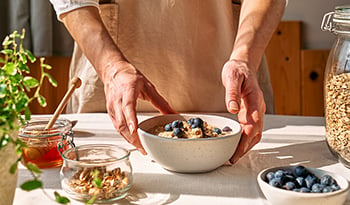10 Natural Ways To Improve Your Microbiome
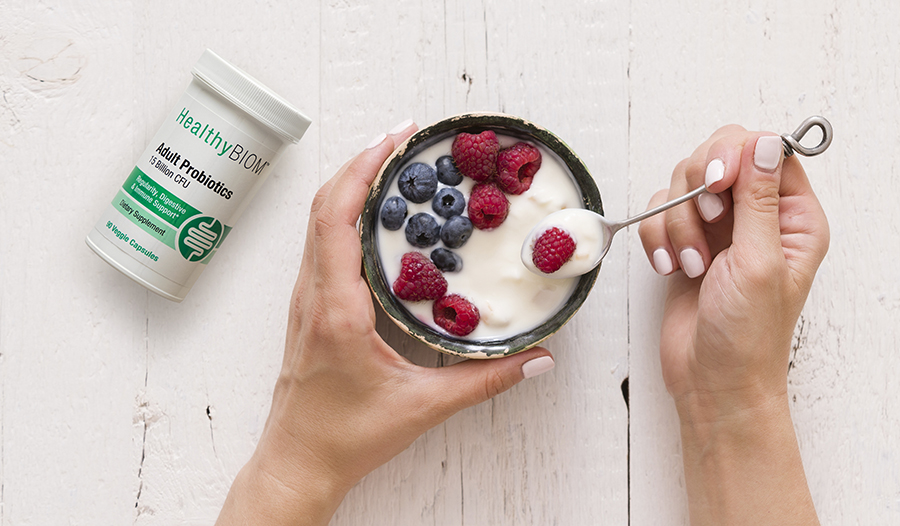
What Is The Microbiome?
Right now approximately 37 trillion microorganisms—mostly bacteria along with fungi, parasites, and viruses—are living in your body. Collectively known as the microbiome, these microbes weigh more than your brain and are almost as vital.
While you can’t see or feel them, they are essential for your survival. In fact, they are so important that the microbiome is often referred to as a “forgotten organ.” When you’re healthy, your microbiome works symbiotically with your body, supporting the immune system, metabolism, and circadian rhythms; fostering good mental health; reducing disease risk; and even aiding weight loss.
Since the majority of these organisms live in your gut, it’s no surprise that they are vital for the digestion and absorption of nutrients and impact body weight and metabolism. They digest potentially harmful food components and manufacture essential nutrients including B vitamins, vitamin K (required for blood coagulation), and amino acids. In addition, they excrete enzymes that help break down complex carbohydrates especially fiber once it reaches the large intestines.
There are thousands of different species of microorganisms inside the body and on the surface of your skin. Your individual bacterial community is established during birth and infancy. Unique as your fingerprint, it changes across your lifetime. Diet, overall health, environment, and illness all influence it. Overuse of antibiotics and a refined diet undermine it and can cause a condition called dysbiosis, where good and bad microbes become unbalanced, undermining health.
The Microbiome And Immunity
The immune system is a complex network of cells, tissues, and systems that protect your body against infection. There are two types of immunity: innate and adaptive. Like a wall around a castle, innate immunity is the first line of defense keeping invaders from entering the body. If invaders pass, adaptive immunity kicks in, flagging foreign substances and then attacking and destroying them.
The microbiome and immune system, which is partially contained in the gut, evolved together and continue to work synergistically to foster mutual health. The immune system supports the development of beneficial microbes and a stable microbial community. Simultaneously, microbes support communication between immune cells involved in the adaptive immune responses. Essentially, microbes in the gut talk to the immune system. This conversation enhances protection against invaders and lowers the risk of the immune system attacking harmless microbes or itself, which is known as an autoimmune response.
The right types of bacteria in the gut keep the immune system working properly. Conversely, the wrong types can disrupt the process, creating inflammation. Research has shown that the microbiome plays a key role in several diseases associated with a malfunctioning immune system including asthma, allergies, diabetes, muscular dystrophy, rheumatoid arthritis, fibromyalgia, and multiple sclerosis.
What is the Microbiome and How Does it Affect Immunity?: Read More.
The Microbiome And Mood
Like the immune system, the brain is also connected to the gut primarily through the vagus nerve and HPA (hypothalamus-pituitary-adrenal) axis, which regulates the body’s stress response. The gut communicates with the brain through neural, immune, and endocrine pathways. It’s lined with neurons that impact how we feel and manufactures 90 percent of serotonin, a neurotransmitter that influences mood.
While more research is needed, it is becoming clear that a healthy gut can help create a healthy mind. A new field of study called nutritional psychiatry is evolving to help understand how gut health and diet can impact mental health. The potential to boost mood and treat conditions including anxiety, depression, and even Alzheimer’s disease by altering the composition of the microbiome through dietary change and supplementation is exciting.
The relationship between the microbiome and mental health is so strong that researchers can identify patients with depression by analyzing the species of microbes in their gut. Compared to healthy individuals, people with major depression have fewer microbes overall and less diverse types. Individuals with bipolar disorder, autism spectrum disorder, and schizophrenia also have significantly different gut microbes than individuals without psychiatric disorders. Animal studies also suggest that gut microbes, brain function, anxiety, and depression are all connected.
A review of over 40 studies found that the Mediterranean Diet and diets that reduce inflammation were associated with a lower incidence of depression. This makes sense given that the Mediterranean Diet is high in dietary fiber, which is a prebiotic known to positively impact the microbiome. Anti-inflammatory diets and the Mediterranean diet are also high in the 12 mood-boosting nutrients: folate, iron, long-chain omega-3 fatty acids, magnesium, selenium, potassium, thiamine, vitamin A, vitamin C, vitamin B6, vitamin B12, and zinc.
St. John’s Wort—The Best Supplement For Mood: Read more.
10 Steps To A Healthier Microbiome
Fortunately, there are many things that you can do to increase the diversity and number of healthy bacteria in your gut. Here are steps you can take starting today.
1. Eat Fermented Foods
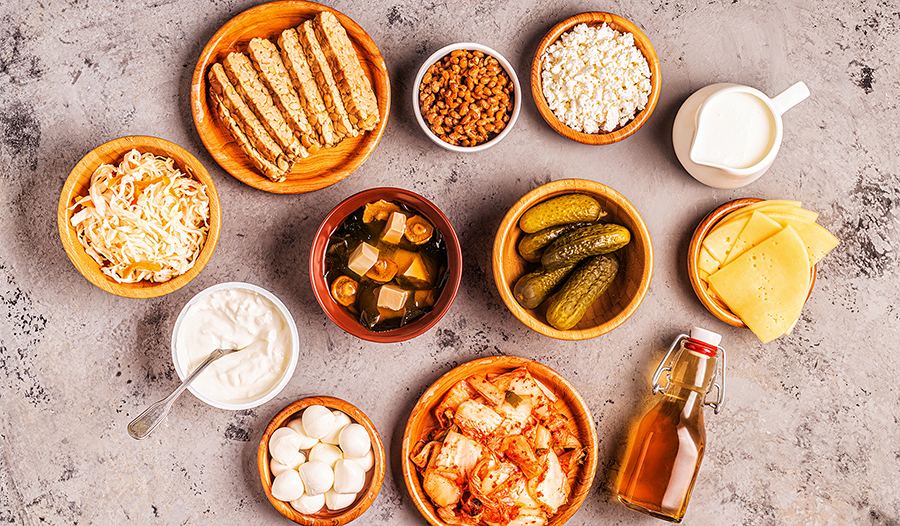
Fermentation is an ancient process that uses bacteria and yeast to break down the carbohydrates in foods. The process preserves food and beverages, creates unique tastes and textures, and provides a tasty way to increase the number of helpful bacteria in your digestive tract. As an added benefit, sugars and starches are broken down, making foods easier to digest and increasing the bioavailability of nutrients.
Kefir and kombucha are probiotic beverages that have been enjoyed for centuries. Kefir originated in the Northern Caucasus in Russia. Made by mixing cow or goat’s milk with kefir grains, it has antimicrobial activities and aids immune system regulation. Perhaps this is why the word kefir comes from keyif, which is Turkish for “feeling good.”
While kombucha seems trendy, it has been enjoyed in China, Japan, and Europe for thousands of years. It’s made by feeding a symbiotic culture of bacteria and yeast (SCOBY for short) sweet tea and allowing it to ferment.
Fermented foods include yogurt, sauerkraut, kimchi (made from cabbage), pickles (which can be made from a variety of vegetables), miso (made from soybeans and grains), and umeboshi paste (made from plum puree).
Health Benefits of Fermented Foods: Read more.
2. Supplement With Probiotics
Also known as “friendly,” “helpful” or “good” bacteria, probiotics are microorganisms that can improve the health of your body, especially your gut. Research shows that they can reduce common side effects that may occur when taking antibiotics and restore healthy bacteria when treatment is over.
The type of bacteria found in probiotic supplements varies. More research is needed to determine the most beneficial strains of probiotic bacteria and which types are best for various health problems.
Lactobacillus and bifidobacteria are two of the most common strains. You can also purchase a broad-spectrum product, which contains a variety of different species.
Probiotics and the Human Microbiome: Read more.
3. Eat More Plants
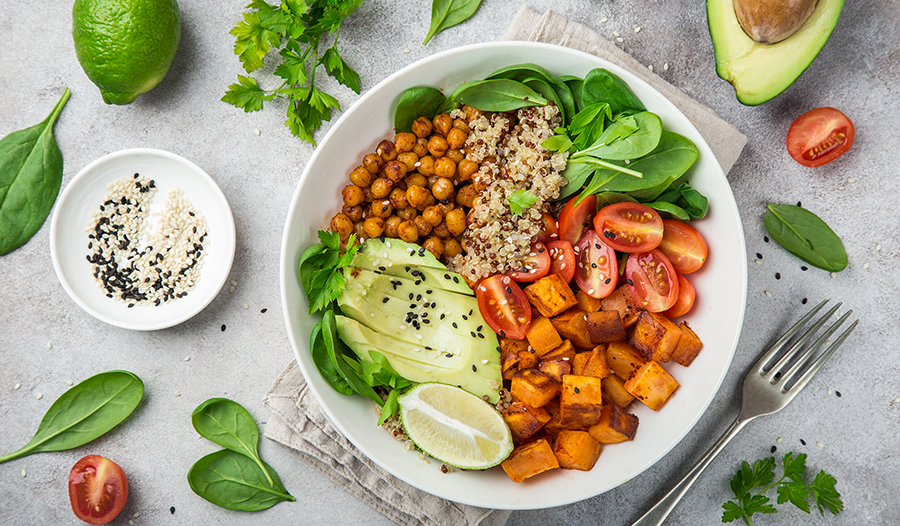
Prebiotics are carbohydrates, primarily fiber, found in plant foods. They pass through your body without being digested and can feed your good bacteria keeping your microbiome healthy.
Prebiotics are found in a variety of foods from fruits and vegetables to beans, seeds, and grains. Good choices include garlic, onions, leeks, chocolate with a high percentage of cocoa solids, yacon root, asparagus, apples, bananas, legumes, tomatoes, soybeans, chia seeds and flaxseeds, spinach, chicory root, barley, wheat bran, whole grains, dandelion greens, Jerusalem artichoke, and oats.
The bottom line is: eat lots of colorful, plant-based foods. Plus, you will crowd out processed foods and fast food, which are packed with chemicals, sugar, and refined carbohydrates which can have a negative impact on your microbiome and health.
4. Drink Tea
Tea along with water is the world’s most consumed beverage. Research shows that drinking tea may foster a well-balanced gut microbiota and help reverse dysbiosis. Most of the evidence supports drinking green tea, but black, oolong, Pu-erh and Fuzhuan teas (a type of fermented tea) have also been shown to help improve gut microbes.
5. Reduce Stress

Stress can contribute to a wide array of health problems including high blood pressure, heart disease, asthma, anxiety, depression, and arthritis. Animal research shows that stress can alter both the types of bacteria in the gut and how the bacteria impact other tissues in the body.
There are many ways to reduce stress. Regular exercise is a powerful de-stressor because it can help lower levels of stress hormones and improve sleep. Journaling about what is upsetting you and what you are grateful for can help lower stress, as can spending time with people you love.
Essential oils including lavender, rose, neroli, sandalwood, ylang-ylang, and bergamot promote relaxation and reduce stress. There are also a number of supplements that can help lower stress. Kava kava, green tea, lemon balm, chamomile, and ashwagandha are a few popular ones to try.
Adaptogens, Stress Management, and Health: Read more.
6. Sleep Well
Along with improving cognition and mood, a good night of sleep can also improve gut health. One animal study found that poor sleep had a negative impact on gut microbes.
There are many things you can do to improve sleep. Creating a sleep ritual, turning off electronics an hour before bed, and keeping your bedroom cool and dark can help you get a good night of rest.
In addition, numerous supplements can support sleep from herbal combinations that include plants such as chamomile and valerian to homeopathic remedies.
The 6 Best Natural Supplements for Sleep: Read more.
7. Go Green When You Clean
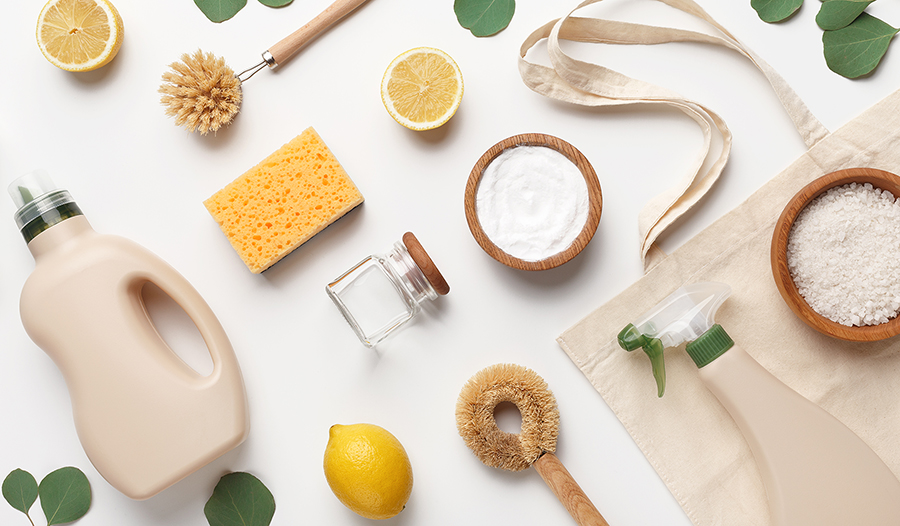
Swapping harsh, toxic cleaning products for natural ones is good for your health, your microbiome, and the planet. Instead of reaching for cleaning products that kill 99% of germs (some of which are actually good for your gut), choose eco-friendly, natural, “green” products that are free from VOCs (volatile organic compounds).
8. Pick Natural Personal Care Products
Your skin and scalp are also covered with bacteria. To keep them healthy, use natural products rather than antibacterial deodorants and antiperspirants, and chemical-laden shampoos and conditioners.
9. Play With Your Pup

Not only will playing with your dog reduce stress, spending time with Fido can help increase the diversity of microorganisms in your gut. Research shows that children who live in homes with dogs have a lower risk of developing asthma and allergies. This may be due to the fact that dogs bring microorganisms into the house, which can increase the diversity of microorganisms in our bodies.
Unexpected Benefit From Furry Pets: Read more.
10. Dig in the Dirt
Spending time outdoors and in nature is great for your mental health and a fabulous way to exercise. In addition, when you expose yourself to dirt and the natural environment you help to improve your internal microbial environment.
References:
- Bond T, Derbyshire E. Tea Compounds and the Gut Microbiome: Findings from Trials and Mechanistic Studies. Nutrients. 2019;11(10):2364. Published 2019 Oct 3. doi:10.3390/nu11102364
- de Oliveira Leite AM, Miguel MA, Peixoto RS, Rosado AS, Silva JT, Paschoalin VM. Microbiological, technological and therapeutic properties of kefir: a natural probiotic beverage. Braz J Microbiol. 2013;44(2):341-349. Published 2013 Oct 30. doi:10.1590/S1517-83822013000200001
- LaChance LR, Ramsey D. Antidepressant foods: An evidence-based nutrient profiling system for depression. World J Psychiatry. 2018;8(3):97-104. Published 2018 Sep 20. doi:10.5498/wjp.v8.i3.97
- Markowiak P, Śliżewska K. Effects of Probiotics, Prebiotics, and Synbiotics on Human Health. Nutrients. 2017;9(9):1021. Published 2017 Sep 15. doi:10.3390/nu9091021
- Magnusson KR, Hauck L, Jeffrey BM, Elias V, Humphrey A, Nath R, Perrone A, Bermudez LE. Relationships between diet-related changes in the gut microbiome and cognitive flexibility. Neuroscience. 2015 Aug 6;300:128-40. doi: 10.1016/j.neuroscience.2015.05.016. Epub 2015 May 14. PMID: 25982560.
- Palmnäs MS, Cowan TE, Bomhof MR, et al. Low-dose aspartame consumption differentially affects gut microbiota-host metabolic interactions in the diet-induced obese rat. PLoS One. 2014;9(10):e109841. Published 2014 Oct 14. doi:10.1371/journal.pone.0109841
- Quigley EM. Gut bacteria in health and disease. Gastroenterol Hepatol (N Y). 2013;9(9):560-569.
- Voigt RM, Forsyth CB, Green SJ, et al. Circadian disorganization alters intestinal microbiota. PLoS One. 2014;9(5):e97500. Published 2014 May 21. doi:10.1371/journal.pone.0097500
- Tun MH, Tun HM, Mahoney JJ, et al. Postnatal exposure to household disinfectants, infant gut microbiota and subsequent risk of overweight in children [published correction appears in CMAJ. 2018 Nov 12;190(45):E1341]. CMAJ. 2018;190(37):E1097-E1107. doi:10.1503/cmaj.170809
- Taylor VH. The microbiome and mental health: Hope or hype?. J Psychiatry Neurosci. 2019;44(4):219-222. doi:10.1503/jpn.190110 https://www.ncbi.nlm.nih.gov/pmc/articles/PMC6606431/
DISCLAIMER:This Wellness Hub does not intend to provide diagnosis...
















































































 Table of Contents
Table of Contents














